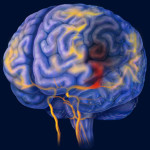Salt Intake and Blood Pressure in Cerebral Small Vessel Disease

Excess salt consumption is associated with increased risk of stroke and cardiovascular complications, such as cerebral small vessel disease. Several studies have established a causal relation between daily dietary salt intake and high blood pressure, which has a prominent role in promoting cardiovascular diseases. However, high sodium might weigh in on the development of cerebral…
White Matter Lesions in Stroke Patients

Aging is associated with the appearance of increased white spots visualized on brain MRI scans. The presence of these anomalies, called white matter hyperintensities, characterizes elderly subjects as well as ischemic stroke patients, regardless of their age. White matter hyperintensities are thought to be caused by small vessel infarcts (restriction in blood flow) in the…
Prefrontal Cortex Lesions and Social Cognition

Recent studies have shown that brain lesions to the prefrontal cortex may cause behavioral disturbances, such as dysfunctional emotional and social behavior. Lesions to this area can lead to severely negative psychosocial consequences: poor recognition of emotions, deficits in empathy and in the ability to understand thoughts and intentions of others. Following this line of thinking, researchers from…
Remote Ischemic Preconditioning: a Neuroprotective Strategy

The small number of effective options to treat neurological dysfunctions following coronary artery bypass grafting provides a strong impetus for defining strategies that may reduce their incidence. Ischemic preconditioning offers a powerful form of endogenous protection against myocardial infarction. It is performed alternating brief cycles of nonlethal ischemia – restriction in blood supply to tissues…
Predicting Outcomes in Acute Ischemic Stroke

Stroke is the second leading cause of death worldwide according to the World Health Organization. A stroke involves the loss of brain function due to a disturbance in blood supply to the brain. It can be caused by either a blood clot that blocks or plugs a blood vessel in the brain (ischemic stroke) or a blood vessel that breaks and bleeds…
Lower Childhood IQ May Be a Predictor of Brain Lesions Associated with Stroke and Dementia

Late-life cognitive decline due to dementia and stroke may have its origins in childhood intelligence, according to a recent study. While previous studies have shown an association between educational level and late-life cognitive decline and dementia, researchers at the University of Edinburgh suggests that early childhood IQ might also be a predictor of late-life organic brain…
 AnalyzeDirect
AnalyzeDirect